#SecurityScan 72: Indian Maritime Security in Red Sea, Taiwan alert on Chinese satellite & more
Israeli strike on an SUV killed a commander in a secretive Hezbollah unit that operates along the border, according to a Lebanese security official.
This article is a summary of important events that have taken place in last one week affecting, India's national security .
News in Brief
Human Security - Addressing the issue of Indian illegal and dangerous migration in USA, Europe
Between November 2022 and September 2023, 96,917 Indians were arrested while entering the US illegally. In 2019-20, the number of Indians caught trying to enter the US illegally was 19,882, while in 2021-22, the number of Indians caught was 63,927.
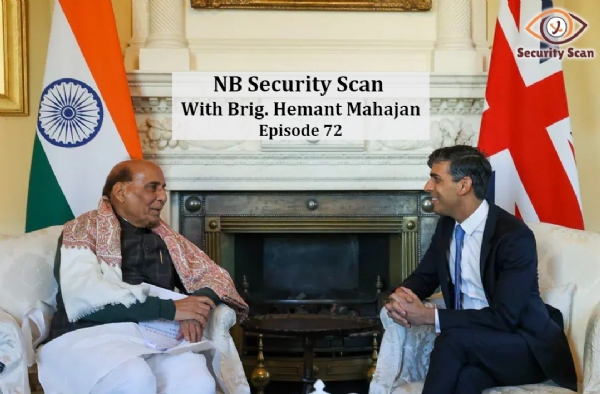
This illegal dangerous migration has to stop as many Indians die in these attempts or get seriously injured or jailed.
Following steps need to be taken:-
Raising awareness: India should launch awareness campaigns to educate potential migrants about the risks and consequences of illegal migration. This could include disseminating information through various mediums, such as television, radio, social media, and community outreach programs.
Law enforcement and legal measures: India should enforce stricter penalties for human trafficking and illegal migration, targeting both the intermediaries facilitating the process and the migrants themselves. This would act as a deterrent and discourage individuals from attempting illegal routes.
Strengthening legal migration channels: India should work towards strengthening legal migration channels by negotiating bilateral agreements with destination countries to facilitate legal and regulated migration. This could involve expanding work visa programs, promoting student exchanges, and encouraging skilled professionals to migrate through proper channels.
International cooperation: India should collaborate with destination countries and international organizations to tackle the issue of illegal migration. This can involve sharing best practices, coordinating efforts to dismantle human trafficking networks, and providing mutual assistance in addressing the issue.
Crackdown on Traffickers: Strengthen law enforcement efforts to dismantle human trafficking networks. Punish those involved in trafficking and create a deterrent for potential migrants who may be enticed by illegal routes.
Consular Services: Enhance consular services to provide support and assistance for Indian nationals abroad. This can include setting up information centers, legal aid services, and outreach programs.
International Cooperation: Collaborate with other countries, especially destination countries, to share information and coordinate efforts in addressing illegal migration. This can involve intelligence sharing, joint operations, and policy discussions.
Countering External & Internal Security Challenges
"Because peace is coming in Kashmir valley, our adversaries are encouraging proxy wars": General Manoj Pande
Attributing the rise to adversaries encouraging proxy wars amid efforts to bring peace to the Kashmir Valley, he noted infiltration attempts along the Line of Control (LoC) but highlighted successful thwarting of such attempts. General Pande also mentioned contracts worth Rs 12,000 crore signed with private Indian firms, focusing on projects like light tanks and future-ready combat vehicles.
Indian Army chief says 416 Myanmar soldiers crossed into India in 2 months
India's army chief, General Manoj Pande, revealed that over 400 Myanmar Army personnel entered India through the porous border in the last two months. The incursions coincide with ongoing clashes between rebel forces and the Myanmar junta. Facing a significant challenge, Myanmar's military rulers grapple with coordinated offensives by ethnic minority forces, resulting in the capture of towns and military posts. Despite the incursions, Indian authorities have been promptly repatriating Myanmar troops crossing the border.
Situation on Northern border is stable but sensitive": Chief of Army Staff, General Manoj Pande
The Chief of Army Staff, General Manoj Pande, stated that the security situation on the northern border is stable but sensitive. He emphasized ongoing talks for a resolution and highlighted high operational preparedness. General Pande noted disruptive technologies in strategic competition, affirmed the alignment of security forces for a stable environment, and mentioned positive developments in Northeast India.
Right sizing the Size of the Army-Approach the Exercise with Caution and Pragmatism
Army Chief General Manoj Pande has informed that a comprehensive plan to right-size the Army has been submitted to the Ministry of Defence (MoD). In preparation for Army Day on January 15, he revealed that the goal is to optimize the Army's strength by reducing it by 1 lakh troops by 2027. The proposed roadmap includes the optimization or potential phase-out of British-era units that are now deemed obsolete. General Pande highlighted examples such as the right-sizing of animal transport units, replaced by more advanced technologies like drones and all-terrain vehicles. This move aligns with the ongoing efforts to modernize and decolonize the Indian military, emphasizing a shift towards quality over quantity, as mentioned in the MoD's year-end review for 2023.
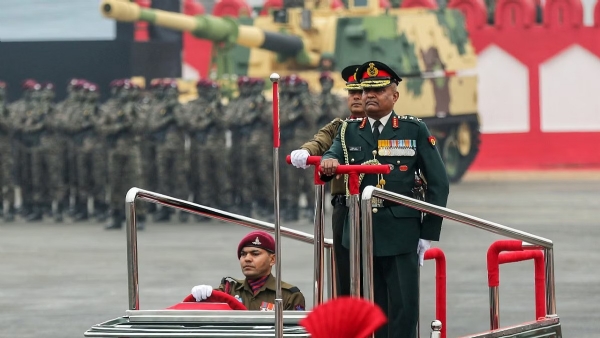
Optimizing manpower necessitates force restructuring, rationalization, and reorganization. The envisioned creation of integrated tri service commands is part of a broader strategy to make the defence forces self-reliant and prepared for the future. Achieving the right 'teeth to tail' ratio presents a significant challenge, especially with the current substantial deployment of troops along the Line of Actual Control in eastern Ladakh. Indian soldiers remain in a constant state of operational preparedness along the borders with China and Pakistan.
The right-sizing initiative demands a cautious and pragmatic approach to ensure national security is not compromised. A clear distinction between expendable and crucial components must be made. The primary objective should be to establish a more efficient and agile military capable of dealing effectively with potential threats. Pursuing adjustments solely for the sake of cost reduction is ill-advised. Additionally, the long-overdue integration of tri services should be prioritized to enhance the forces' readiness for contemporary and future warfare scenarios.
Defence Minister Rajnath Singh Visit to London
This historic visit signifies the first by an Indian Defence Minister to the UK in 23 years, aiming to strengthen the India-UK Comprehensive Strategic Partnership and discuss the ongoing Free Trade Agreement negotiations. His agenda involved interactions with UK defense industry leaders, community representatives, and high-level officials, aiming to deepen military collaboration and foster defense industrial partnerships. The visit signifies a push for stronger Indo-UK ties in the Indo-Pacific region, emphasizing maritime security cooperation with nations like Oman and Kenya.
Defence manufacturer Hindustan Aeronautics showcases its product line at Vibrant Gujarat
Hindustan Aeronautics Limited (HAL) showcases India's aerospace prowess at the 'Vibrant Gujarat Global Trade Show 2024,' emphasizing 'Aatmanirbhar Bharat' (Self-reliant India). HAL highlights indigenous products like the Su-30 MKI aircraft and Prachand Light Combat Helicopter (LCH), exhibiting capabilities in aerospace technology. With over 100 items earmarked for indigenization, HAL aims to reinforce self-reliance in defense manufacturing. The event fosters interaction with the Indian industry to bolster the aerospace ecosystem in line with the government's goal of achieving Rs 175,000 crore in indigenous defense manufacturing by 2024-25.
INDIAN MARITIME SECURITY IN RED SEA
The situation highlights the complex geopolitical dynamics at play in the Red Sea region, particularly with the involvement of the Houthi rebels in Yemen and the global response to their actions. India should consider some key points:
Global Division and Reluctance to Act: The global community, as represented by the UN Security Council, seems divided on how to address the Houthi attacks. Some nations support resolutions condemning the attacks, while others, such as Russia, China, Algeria, and Mozambique, abstain from taking a clear stance. This division may be influenced by various factors, including political considerations, economic interests, and regional alliances.
Fear of Being Seen as Anti-Palestine: The reluctance of some countries to take a strong stance against the Houthi attacks may stem from the perception that doing so could be interpreted as being anti-Palestine. This is a complex issue that involves navigating the political and ideological landscape of the Middle East.
Economic Interests vs. Security Concerns: Countries like Egypt and Jordan, which have significant economic stakes in the Red Sea, may be hesitant to openly condemn the Houthis for fear of economic repercussions. The potential disruption of trade routes and economic losses could outweigh their willingness to take a strong stance against the Houthi actions.
Military Deployments and Defensive Measures: Despite the deployment of a considerable number of warships by various countries, the Houthi attacks persist. The challenge lies in effectively countering the unconventional tactics employed by the Houthi rebels, such as drone attacks. Defensive measures alone may not be sufficient, leading some nations to consider more assertive, offensive actions.
Diplomatic Solutions: The mention of diplomacy as a potential solution suggests that addressing the root causes of the conflict and engaging with relevant stakeholders, particularly Iran, may be crucial. Pressuring Iran to rein in the Houthi rebels, given their close ties, could be a diplomatic avenue to explore. However, achieving consensus on such an approach requires coordinated international efforts.
Global Impact of Red Sea Security: The Red Sea's significance in global trade underscores the broader implications of the security situation. With approximately 12 percent of global trade passing through the Red Sea, the unrest in the region goes beyond regional concerns and becomes a matter of global importance.
In summary, the situation in the Red Sea highlights the challenges of balancing geopolitical interests, economic considerations, and security concerns. Effective resolution may require a combination of diplomatic efforts, international cooperation, and a nuanced approach that addresses the underlying causes of the conflict.
Challenges for India
Strikes unleashed on Houthi targets in Yemen by a US-led coalition were predictable. Earlier, they had issued an ultimatum to Houthis to stop attacking commercial vessels using the Red Sea route. Their warnings were ignored and a response to breaching a red line was inevitable. Of greater worry are increasing risks that the collateral firefights of Israel-Hamas conflict can spiral out of control.
US military estimated that Houthis have carried out 24 attacks on commercial shipping since mid-November. It has pushed up sea transport costs and marine insurance. Red Sea is the shortest seaborne route connecting Asia and Europe. Roughly 15% of global seaborne trade passes through it, which includes oil, LNG and food grains. The alternate route is around South Africa, which can increase shipping time by 7-20 days. The outcome of Houthi attacks is that spot market prices for 40-ft containers from China to Rotterdam increased 115% over a week to $3,577 on January 4.
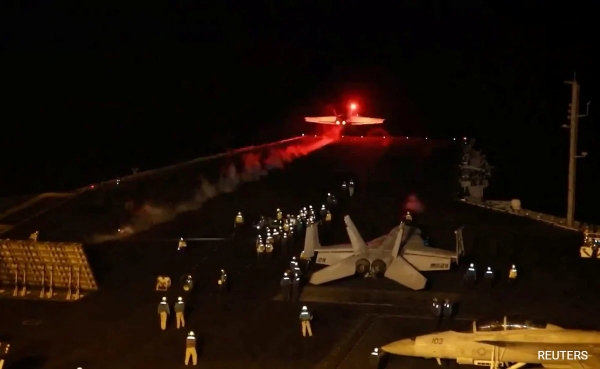
Hopefully, US strikes will act as a deterrent and cap the damage. However, there’s also the chance that it can drag Iran directly into the conflict, which will affect the critical Persian Gulf shipping chokepoint.
India is an interested party as ensuring safe navigation through Red Sea is of direct economic interest. Also, Indian sailors are employed on commercial vessels flying other flags. So far, India has avoided direct involvement. But in its own interest, India may soon have to support the US-led coalition seeking to enforce freedom of navigation.
India is increasing warship deployment to counter piracy in Arabian Sea
India is set to significantly boost its anti-piracy efforts in the Arabian Sea, increasing warships fivefold to counter rising threats. Following recent incidents, a dozen warships, each equipped with marine commandos, helicopters, and US-made drones, will patrol the region.
Chief of Naval Staff Admiral Hari Kumar announced that the Indian Navy is actively deploying its fleet to prevent piracy and contain pirates within their waters. He disclosed that there have been approximately 35 drone attacks on ships in the Red Sea, North, and Central Arabian Sea in the past 40-42 days, mainly targeting Israel-owned or flagged vessels Navy.
Chief unveils first indigenously manufactured UAV from Adani Defence & Aerospace
Indian Navy Chief Admiral R Hari Kumar unveiled the Drishti 10 Starliner drones, manufactured by Adani Defence, at the company's Aerospace Park in Hyderabad. The drone is an advanced Intelligence, Surveillance, and Reconnaissance (ISR) platform with 36 hours of endurance and a 450 kg payload capacity.
India-Russia defence coop remains unprecedented with full transfer of tech: Denis Alipov
“we are working on joint development and manufacturing of the most sophisticated systems, ensuring a significant contribution to the “Make in India” and “Self-reliant India” initiatives,” Denis Alipov said at a session earlier this week in New Delhi at VIF-Valdai Club.
Fighter jet engine deal with India to start this year: GE Aerospace's Amy Gowder
GE Aerospace Defence & Systems President Amy Gowder in an exclusive interview with ET shared that India's fighter jet engine technology deal with the US is progressing on time and a detailed technical proposal with Hindustan Aeronautics Ltd (HAL) will be shared with HAL soon. The timeframe for starting engine production will depend on the requirements of the Indian Air Force and Defence Research and Development Organisation but broad plans are to prepare for deliveries within three years.
Victory for Prime Minister Sheikh Hasina's Awami League Good News For India
Bangladesh's recent parliamentary election resulted in a resounding victory for Prime Minister Sheikh Hasina's Awami League, marking their fourth consecutive win. The outcome was largely expected, especially after the main rival, the Bangladesh Nationalist Party (BNP), opted to boycott the election.
Prime Minister Hasina hailed the triumph as a victory for the people and emphasized that Bangladesh demonstrated the ability to conduct free, fair, and neutral polls. Despite a relatively low voter turnout (around 40%) and isolated incidents of violence, international election observers, including those from India, praised the transparency of Bangladesh's electoral process. The government's proactive approach in inviting observers from various nations and multilateral organizations aimed to ensure transparency in the election proceedings.
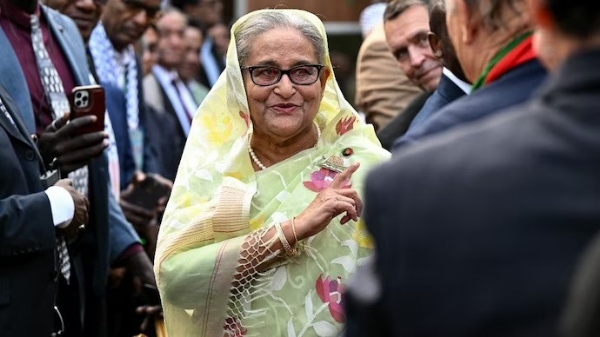
The path to democracy in Bangladesh has been fraught with challenges since the assassination of 'Father of the Nation' Sheikh Mujibur Rahman and most of his family members in 1975. The subsequent decade and a half witnessed military dictatorship, which weakened the country politically and economically. Over the past decade, Bangladesh has experienced economic growth alongside political stability. While the voter mandate deserves respect from all parties, the government must responsibly investigate allegations of electoral malpractices and highhandedness. The BNP lacks the moral authority to cry foul, having chosen to abstain from participating in the ballot, a fundamental element of democracy.
India As World Tourist Destination
The recent visit of Prime Minister Narendra Modi to Lakshadweep has thrust this captivating Union Territory, consisting of 36 islands, into the limelight. The Prime Minister's snorkeling excursion amidst the breathtaking beaches triggered a surge in online searches worldwide, surpassing the typical fervor observed for neighboring destinations like the Maldives. The controversy sparked by derogatory remarks from three Maldives ministers, perceiving Lakshadweep as a threat to their country's tourism sector, has only intensified global interest in the UT. The #ExploreIndianIslands campaign gained significant momentum as celebrities joined the initiative to promote our own tourism potential.
This presents a timely opportunity for the Lakshadweep administration to awaken and position itself as a preferred destination for both domestic and international tourists. To capitalize on this surge in interest, the focus should be on meeting travelers' expectations regarding the natural beauty of the place and the warmth of its hospitality. The heightened interest in these enchanting islands could lead to an economic boom, creating new business opportunities for the local population.
Current policies that restrict tourists, dictating what they can experience and where they can travel, pose challenges for holidaymakers. It is crucial to review these policies and dispel any misconceptions about the islands. Simultaneously, to compete with the well-established tourism industry of the Maldives, the authorities must undertake a comprehensive overhaul of infrastructure. This includes improving connectivity to the islands and providing world-class hotels and resorts to enhance the overall tourism experience.
#COUNTERING CHINESE MULTI DOMAIN , GREYZONE, HIGHBREED WARFARE
Beijing will 'never compromise' on Taiwan: Chinese military tells US
China "stressed that it will never compromise or back down on the Taiwan issue," the ministry said in a readout of the talks in Washington, held Monday and Tuesday, urging the United States to "stop arming" the self-ruled island, which is holding elections this week.
Taiwan issues alert over China satellite as poll ramps up security fears
Taiwan issued a national emergency alert after China launched a satellite ahead of its crucial presidential election. The alert, triggered by a mistranslation, caused alarm but was clarified as debris-related. Vice President Lai Ching-te accused Beijing of influencing the election via intimidation tactics. With tensions high, candidates, notably Lai, emphasize caution regarding China's actions, advocating for strength and deterrence against potential threats to Taiwan's sovereignty. The election's significance lies in shaping cross-strait ties amidst Beijing's assertiveness and Taiwan's concerns about maintaining autonomy.
Taiwan's defence ministry issues an air raid alert saying China has launched a satellite
China views Taiwan, which is about 160 kilometers (100 miles) off China's east coast, as a renegade province that must come under its control. The alerts went off in the middle of an international news conference by Taiwanese Foreign Minister Joseph Wu. He clarified it was a satellite launch, told journalists not to worry, and proceeded with the news conference.
China detains UK's MI6 spy for collecting intelligence, identifying potential assets
China's civilian spy agency, the Ministry of State Security (MSS), said in a statement that it had apprehended an individual surnamed Huang working with Britain's MI6 while leading a foreign consultancy. However, the agency did not mention Huang's full name, gender or nationality, nor identified the company they worked at.
#HAMAS ISRAEL WAR - LESSONS FOR INDIA
Gaza to Red Sea: Learning Drone Warfare
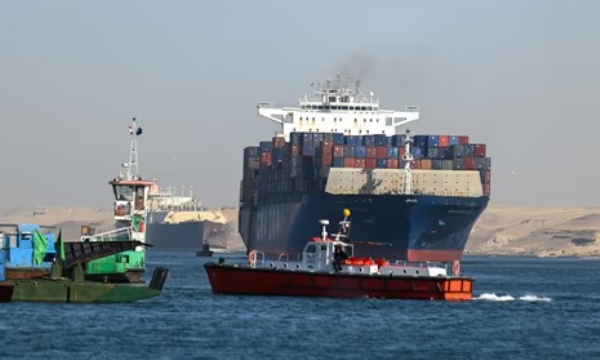
Israel, which like Ukraine has a nimble tech sector, has deployed drones against Hamas in a variety of ways, including for reconnaissance of the underground labyrinths in Gaza. In the spillover conflict in the Red Sea, Houthi drones have been shot down by US navy destroyers. In India this has brought to the fore our navy’s want of anti-drone equipment.
Lessons for India
This is asymmetrical warfare. Experts have noted that even the US navy hasn’t used its next-gen weapons against the Houthi drones. Because this may eat up millions of dollars to take out a few thousands worth of enemy equipment. The amount of catching up India must do can be gauged from the civilian drone space. Here, reports indicate that Chinese competition continues to prevail over local sellers despite an import ban. Against this backdrop, the deployment of an indigenous anti-drone system, if it comes through, will mark a very significant defence milestone.
Israeli strike kills an elite Hezbollah commander Wissam al-Tawil in the latest escalation linked to the war in Gaza
The Israeli army reports 185 soldiers killed in clashes with Hamas in Gaza. Following Hamas's deadliest attack, Israel's response resulted in civilian casualties and captives. Israel intends to persist in its conflict with Hamas through 2024.
The Israeli army intensifies strikes on Gaza amid clashes with Hamas as US Secretary of State Antony Blinken aims to de-escalate tensions in the Middle East. Reports highlight ongoing conflict, including airstrikes in Palestinian cities and Hezbollah's drone attack on Israel.
The strike on an SUV killed a commander in a secretive Hezbollah unit that operates along the border, according to a Lebanese security official who spoke on condition of anonymity in keeping with regulations. The commander, Wissam al-Tawil, was a veteran of the Iranian-backed Lebanese force who took part in the 2006 cross-border kidnapping of two Israeli soldiers that triggered the last war between Israel and Hezbollah, an official in the group said.
India in constant touch with Israel, Palestine leaders: Ambassador Kamboj tells UNGA
In a statement to the United Nations General Assembly, India's Permanent Representative to the UN, Ambassador Ruchira Kamboj, emphasized the need for early restoration of peace and stability. Ambassador Kamboj expressed concern over the large-scale loss of civilian lives, particularly among women and children, and the resulting humanitarian crisis. She strongly condemned the death of civilians, stating that it is "clearly unacceptable."
--
Total Views |


